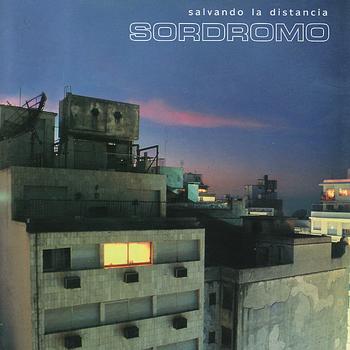
"Salvando La Distancia" Was Issued In 2002, And It Was A Gold Record By The End Of The Year
A Uruguayan band that combined rock instrumentation with some electronic beats and scratches in quite an engaging way, Sordromo released “Salvando La Distancia” [Closing The Distance] in 2002. To me, the album (issued by Bizarro Records) exemplified how their approach (which yielded very good results in terms of singles) could be a little monotonous over an extended work. In the case of “Salvando La Distancia”, the monotony was aggravated by the solipsistic nature of the lyrics – all of the songs (with the exception of “Música Fea” [Ugly Music] and “Ventanas” [Windows]) were romantic fare. The combination could be a little debilitating sometimes, specially during the mid-section of the album.
Still, the disc had more than a few remarkable compositions – and then some. The first five tracks in particular were praiseworthy, with the singles “Las Cosas Del Querer” [The Way Loving Is] and “Como Un Sueño” [Like A Dream] achieving a phenomenal amount of exposure in Uruguayan radio. The two songs were also prime examples of the band’s marriage of rock instrumentation and electronic motifs. But the best example of Sordromo’s signature sound found on the disc was to be “Salvaré” [I Will Close], a song that mixed strangled guitar ruminations and matching electronic beats under a lyric dealing with separation akin to disintegration, and the will to overcome it come what may.
And the songs “A Solas” [Alone] and “Ventanas” [Windows] were quite anthemic, even if the lyrical devices they contained were nothing new. A sample line from “A Solas”: “A solas / con todos / duele / sé que no te gusta estar a solas con otros / se hace tan difícil cuando estás a solas” [Alone with everybody / I know you don’t enjoy being alone with others/ it gets so hard when you have to be alone]. The song is more than acceptable on the whole, though, with the pervasive drums making it resonant from the very first verse already. And “Ventanas” [Windows] dealt with the importance that even just a tiny amount of support brings to those who are abated, effectively underlining the title of the album and highlighting how some of the biggest divides actually exist between people who are close in physical terms.
However, come the sixth track (“Los Errantes” [The Wanderers]) and the similar way the band tackled each and every song began to take its toll. “Cuando Apagás La Luz” [When You Turn Out The Lights] and “Sólo Palabras” [Only Words] seemed indistinct. Repeated listens were to prove that they were catchy in themselves, though, with the choruses standing out above everything. And “Música Fea” [Ugly Music] had a suitable intro, yet the band was to grow waxen within twenty seconds, leaving you with a dirge-like composition.
However, the three closing tracks (which seemed like minor efforts at first) would prove to be quite memorable – “Salvaré” was a realized slow burner, whereas both “Desamor” [Heartache] and “Desnorteados” [Without North] put a fine point on the themes the disc dealt with. Sometimes the only way to close the distance is to end up losing your bearings. That was the message conveyed by the final track. To be a someone to somebody you have to lose a certain part of yourself. You might think that was not a conciliatory way to end the album. It was not. And I am sure that was what the band intended. I think they just wanted to have you thinking about the way relationships can go astray, and how they can be brought back in track (but not into focus) when that happens.
And more than a good couple of years later, the album still stands as something hugely successful. It might sound formulaic sometimes, but that does not tarnish its expressivity. And the one distance that really matters – that which can separate a listener from a performer – is absolutely closed when the CD finishes playing. In that sense, it will always be a fully realized work.
Rating: 7.5/10
Sordromo’s official site is found here. And this is their MySpace profile.

Pingback: Los Amigos Invisibles (Sordromo) – Uruguayan Music | MusicKO